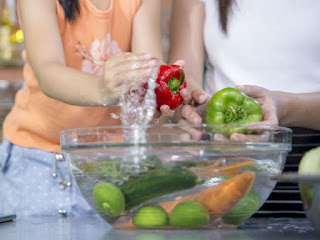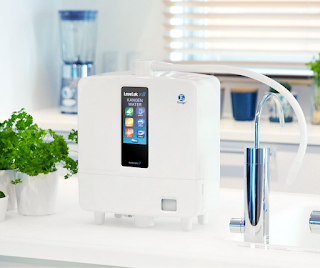What's Lurking on your Produce?
 |
WATCH: How To Wash Your Produce |
Case Study on Water pH and the Effectiveness of Pesticides.
F. M. Fishel, J.A. Ferrell, Water pH and the Effectiveness of Pesticides. University of Florida IFAS Extension Publication PI-156 http://edis.ifas.ufl.edu/pi193
1. This document is PI-156, one of a series of the Agronomy Department, UF/IFAS Extension. Original publication date June 2007. Revised October 2010, November 2016, and September 2019.
Environmental Working Group's (EWG) 2019 Shopper's Guide to Pesticides in Produce™
Over Half of Samples of Kale Tainted With Possible Cancer-Causing Chemical
WEDNESDAY, MARCH 20, 2019
Nearly 70 percent of the produce sold in the U.S. comes with pesticide residues, according to EWG’s analysis of test data from the Department of Agriculture for our 2019 Shopper’s Guide to Pesticides in Produce™.
The most surprising news from the USDA tests reveals that the popular health food kale is among the most contaminated fruits and vegetables. More than 92 percent of kale samples had two or more pesticide residues detected, and a single sample could contain up to 18 different residues. The most frequently detected pesticide, found on nearly 60 percent of kale samples, was Dacthal, or DCPA – classified by the Environmental Protection Agency since 1995 as a possible human carcinogen, and prohibited for use in Europe since 2009.
Overall, the USDA found 225 different pesticides and pesticide breakdown products on popular fruits and vegetables Americans eat every day. Before testing, all produce was washed and peeled, just as people would prepare food for themselves, which shows that simple washing does not remove all pesticides.
The USDA had not tested kale for almost a decade. But even as its popularity as a food rich in vitamins and antioxidants has soared, the level and number of pesticide residues found on kale has increased significantly. EWG’s analysis places kale third on this year’s Dirty Dozen™, our annual ranking of the fruits and vegetables with the most pesticides.
EWG'S DIRTY DOZEN FOR 2019
- Strawberries
- Spinach
- Kale
- Nectarines
- Apples
- Grapes
- Peaches
- Cherries
- Pears
- Tomatoes
- Celery
- Potatoes
Each of these foods tested positive for a number of different pesticide residues and contained higher concentrations of pesticides than other produce. Key findings:
- More than 90 percent of samples of strawberries, apples, cherries, spinach, nectarines, and kale tested positive for residues of two or more pesticides.
- Multiple samples of kale showed 18 different pesticides.
- Kale and spinach samples had, on average, 1.1 to 1.8 times as much pesticide residue by weight than any other crop.
Dirty Secrets from the Supermarket!
1. Produce isn't washed before it hits shelves
2. The average supermarket apple is over a year old
3. Employees often don't follow health policies
Washing Produce
4. Your fellow customers are also part of the problem
5. Some fruits and veggies are especially risky
What can you do to ensure the cleanest fruit and vegetables make it to your table?
 |
| Kangen Water Machines |


1. Buy Local
However, there are times when a recipe calls for something that can’t be found locally. Always make sure to purchase certified organic produce to reduce your exposure to pesticides and GMO’s. Most grocery stores now carry a wide variety of organic fruits and vegetables making it easier than ever to eat cleaner, fresher food. Remember, once you bring home your produce, you should still wash it with Kangen Water® to remove airborne bacteria and viruses.

2. Wash Your Produce
Alkaline water is best for rinsing fruits and vegetables because it can neutralize many of the toxic residues that plain water can’t. Additionally, many people find that their vegetables actually taste better after soaking in the alkaline water as well. Because of this, you should consider a water ionizer to be an essential part of healthy eating, in addition to a healthy source of drinking water.
Shop all our Kangen Water Machines to Ensure You are
Serving the Healthiest Fruits and Vegetables


No comments:
Post a Comment